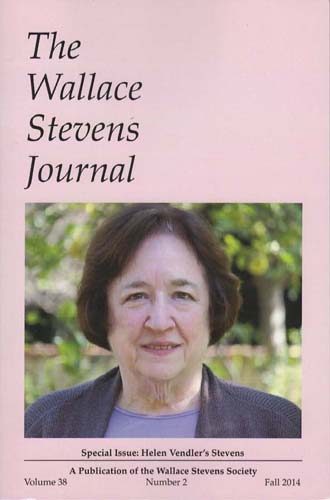The Wallace Stevens Journal – Fall 2014
The first issue of The Wallace Stevens Journal appeared in the spring of 1977 and has enjoyed regular quarterly publication ever since. This latest issue focuses on noted Stevens scholar Helen Vendler, who published her initial Stevens study On extended wings: Wallace Stevens’ longer poems in 1969. This was the first book of her criticism proper after trade publication of her PhD dissertation on Yeats in 1963, just of her many writings upon Stevens, demonstrating how central Stevens has been to her critical work as both reader and scholar of American poetry. Vendler’s contribution to the world of Stevens readers as well as to all poetry readers is undeniably immense. She has published dozens of critical studies and edited several important popular anthologies. Yet as Bart Eeckhout’s contribution here notes, “this special issue is not primarily a festschrift, however, but a scholarly attempt at continuing a critical dialogue along the lines of inspiration drawn by Vendler.” The first issue of The Wallace Stevens Journal appeared in the spring of 1977 and has enjoyed regular quarterly publication ever since. This latest issue focuses on noted Stevens scholar Helen Vendler, who published her initial Stevens study On extended wings: Wallace Stevens’ longer poems in 1969. This was the first book of her criticism proper after trade publication of her PhD dissertation on Yeats in 1963, just of her many writings upon Stevens, demonstrating how central Stevens has been to her critical work as both reader and scholar of American poetry. Vendler’s contribution to the world of Stevens readers as well as to all poetry readers is undeniably immense. She has published dozens of critical studies and edited several important popular anthologies. Yet as Bart Eeckhout’s contribution here notes, “this special issue is not primarily a festschrift, however, but a scholarly attempt at continuing a critical dialogue along the lines of inspiration drawn by Vendler.”
The issue includes “Helen Vendler’s Publications on Stevens: A Selected Chronological Survey” as well as a short interview with her regarding his continuing relevance. In regard to the latter, Vendler is clearly matter-of-fact in her opinions regarding the matter:
[. . .] whether an author will survive has nothing to do with “academic institutionalization.” George Herbert was never “academically institutionalized,” and he’s still around, as are his predecessors and followers. The academic study of English literature is very recent; a poet’s reputation is made and confirmed and consolidated by the admiration of fellow poets, early and late.
Despite not being a “festschrift,” this issue does contain a healthy dose of personal responses alongside critical re-evaluations of Vendler’s work on Stevens. John Serio describes Vendler’s Words Chosen Out of Desire as “a landmark study that serves as a corrective to misreadings of Stevens as aloof, cerebral, and impersonal.” He then emphasizes “In both her teaching and scholarship, Vendler sees it as her mission to reveal the deep, personal feeling that impels Stevens’ poetry.” While Lisa Goldfarb attests that:
Helen Vendler has so shaped the course of Wallace Stevens studies—from the publication of On Extended Wings to her most recent Last Looks, Last Books—that it is difficult to think of Stevens’ poems without simultaneously thinking about how she has shaped our reading of them.
Goldfarb continues, “Vendler draws us into her reading as if it were her utterance, she urges us to read Stevens’ poems, too, as if they were likewise our own” and this is not too surprising as Vendler’s now famous introductory comment in Words Chosen Out of Desire states that Stevens “is the poet whose poems I would have written had I been the poet he was.”
It’s easy to feel that when it comes to Stevens, Vendler more or less becomes the poet with her commentary. Stephen Burt’s claim that “Helen Vendler is, and has been since the 1970s, more closely connected to Wallace Stevens than to any other single poet” not only rings true, but is substantiated by all the responses offered here where the discussion is richly varied and often quite in depth. The issue opens up into consideration of further ideas beyond Stevens alone: larger debates within the poetry world between various camps of readers, commentators, and poets themselves.
Al Filreis, commenting upon an omnibus review of Vendler’s concerning several bits of Stevens scholarship in the 1980s, notes:
There’s little getting around Vendler’s distaste for variously founded critical distastes for Stevens in the mid-1980s, nor can one misunderstand her sense of the damage being done by what she calls Davidson’s “uniform misunderstanding of Stevens” (551). Yet despite the pleasure (is that the word?) of looking back on the world of Stevens’ critics and readers at that moment, it seems that the lines of distinction and disagreement were (and still are) not so clearly drawn—and that even then they crossed and got productively confused.”
In the end, despite its rather mysterious nuances, the poetry of Wallace Stevens is safely ensconced upon the slopes of just about anybody’s Mount Parnassus of American Poetry. Stevens (1879-1955) is readily ranked as a major literary presence. However, modern American poetry has too often been split in two camps with Stevens seen as some sort of saving antidote to the negative influence of what’s seen as the indiscriminately experimental practice of poets such as Ezra Pound, Gertrude Stein, H.D., and William Carlos Williams. For decades this has created a sort of false dynamic between poetry camps which thankfully has for now more or less evaporated with the recent MFA generation come up in the age Facebook and Google. It appears that finally everybody is reading everybody (or at least everybody their friends are reading.) Which one way or another is most likely a good thing.
[www.wallacestevens.com]





